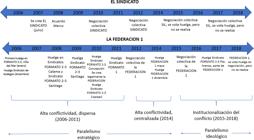ABSTRACT
Despite the precariousness and the general decline in union activity, experiences of revitalization and countermovement of workers have been rediscovered, which are presented as heroic deeds and without structuring effects on working conditions, in a scenario of progressive commercialization of society. Based on the case study of Walmart in Chile, it is argued that union activity within the company has promoted the transformation of its work regime, going from a “despotic” one, based on wage insecurity, abuse, and practices anti-union, to another, “segmented hegemonic”, with better treatment, attempts at regulatory control, promotion of unionization and unequal material benefits. The article concludes by reaffirming the thesis that the autonomous organization of workers is possible in contexts of precariousness, that precariousness is reversible, and that the control of work in retail has reproduction limits under purely despotic and anti-union mechanisms.
Work Regimen; Unions; Retail; Class Commitment

 Thumbnail
Thumbnail
 Fuente: elaboración propia en base a revisión de prensa, entrevistas y reportes de sustentabilidad de la empresa.
Fuente: elaboración propia en base a revisión de prensa, entrevistas y reportes de sustentabilidad de la empresa.